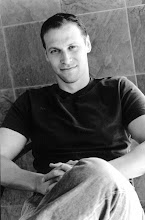Tuesday, October 31, 2006
Thursday, October 26, 2006
Jim Webb's Novels and the Strategic Idiocy of Senator Allen
Now I've yet to get political on this blog, but I can say in all seriousness, give us a fucking break here. Are we really going to judge men and women who run for office in this country by nasty (or merely sexual) things that their characters say and do? I guess that rules out pretty much anyone in the entire crime fiction community from running for public office. I know I've written some particularly graphic things, sometimes words in the mouths of characters, sometimes in point of view or free indirect discourse of a character, sometimes in the tone of a narrator who - newsflash - is not me. It's not just those of us who write crime fiction who could be called to moral task here - it could be anyone who's ever written about, uh, conflict. Or assholes. Or racists. Or misogynists. Let's just not portray those people at all. In fact, let's not write about these topics. Allen's campaign is now judging literary themes, and sensing "patterns" in Webb's portrayal of women. So I guess Joyce and Hemingway are screwed too. And Christ - what to do if someone catches Dianne Feinstein reading Sanctuary? A U.S. Senator, exposing herself to a book with a graphic corn-cob rape scene? Surely a human such as that wouldn't be fit to hold public office.
This is clearly a calculated absurdity. There's no question it will prove effective, but I hope it's roundly condemned in thinking quarters as well.
Monday, October 16, 2006
Israel and, uh, Comics
Here's the link for those of you who read Hebrew or want to check out some Foolkiller graphics (actually, if you scan down the page, you can read the interview in English):
http://www.superheroesetc.co.il/columnpiece.asp?item=367
Friday, October 06, 2006
Is There Such a Thing as Non-Literary Fiction?
The following section is from an amazing Washington Post article, in which Ayn Rand compares the writing of Mickey Spillane, rarely the critics' favorite, to those of Thomas Wolfe:
"Rand appreciated Spillane's precision as a writer, and in an essay on literature (which appears in her book "The Romantic Manifesto") quotes from Spillane's description of New York at night as an example of his skill -- "The rain was misty enough to be almost foglike, a cold gray curtain that separated me from the pale ovals of white that were faces locked behind the steamed-up windows of the cars that hissed by. Even the brilliance that was Manhattan by night was reduced to a few sleepy yellow lights off in the distance" -- and then compares it to a passage by Thomas Wolfe -- "The city had never seemed as beautiful as it looked that night. For the first time he saw that New York was supremely, among the cities of the world, a city of night. There had been achieved here a loveliness that was astounding and incomparable, a kind of modern beauty, inherent to its place and time, that no other place nor time could match."
